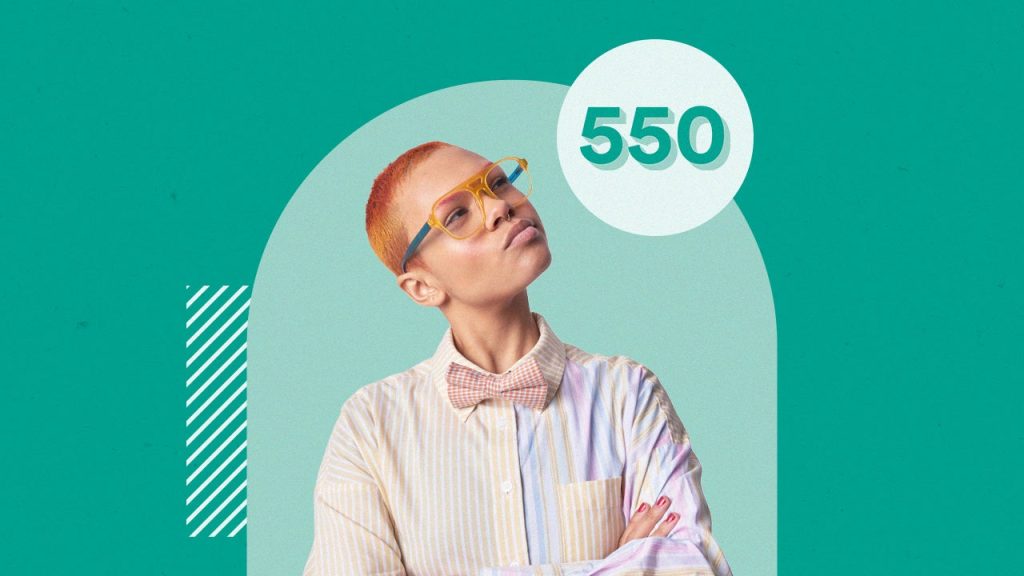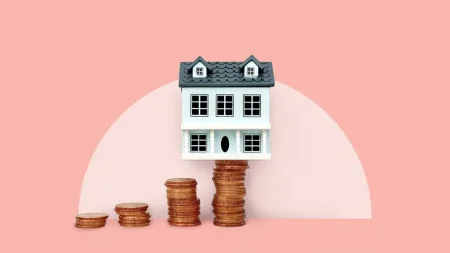We Are/Getty Images; Illustration by Austin Courregé/Bankrate
Key takeaways
- It’s possible to qualify for a loan with a 550 credit score. However, the lower your credit score, the higher your personal loan interest rate will be.
- Consider using a cosigner or applying for a secured loan to increase your approval odds.
- Choose lenders that offer prequalification to avoid additional damage to your credit score.
- Compare offers from multiple lenders or use a marketplace site like Bankrate.
Yes, it’s possible to get a loan with a 550 credit score, but approvals are harder, and rates and fees are much higher. A 550 score is in the range that FICO classifies as “poor.”
Lower scores may mean you’ve missed payments or defaulted on loans in the past. A low score could also mean you’re one of the two in five credit card holders who have maxed out a credit card since the Fed started hiking rates, according to Bankrate’s Credit Utilization Survey.
There’s a silver lining: Using a personal loan to pay off those cards could give your scores a boost. Before you apply for a bad credit loan, consider how it will help you, what kind of terms you’re likely to get and which lenders offer them.
Can you get a personal loan with a low credit score?
Yes, you can get a loan with a low credit score, even one as low as 550. But lending to borrowers with bad credit can be risky for lenders. As a result, you can expect the following:
- A higher interest rate: Your credit score is the top factor determining your interest rates with most lenders. You could face a rate as high as 35.99 percent with a 550 credit score.
- A smaller loan amount: Lenders think a low credit score means a borrower is more likely to fail to repay a loan. As a result, they may limit the amount you can borrow to reduce the chance that you’ll stop repaying the debt.
- A shorter repayment term: With a low credit score, you’re unlikely to qualify for a lender’s maximum term since extended repayment means more time to default. Unfortunately, a shorter repayment term means higher monthly payments, which could be harder to keep up with.
- Higher fees: Many bad credit lenders charge origination fees of up to 12 percent of your loan amount. This fee is deducted before you receive your loan funds, meaning you may have to borrow more than you need to account for the fee.
- Increased chance of rejection: A 550 score tells lenders you have some credit mishaps in your history. To weed out the lenders that aren’t likely to approve your loan, get prequalified to determine your eligibility without impacting your credit.
-
Aggressive debt collection tactics: Lenders who knowingly take on higher risk may be prepared for potential consequences and may be more apt to utilize debt collection to get what’s owed. Payday loans are notorious for making incessant and harrassing phone calls and threatening legal action if you fail to make your payment.
“Any lender dealing in such loans expects many defaults and losses, and acts accordingly,” says Michael Sullivan, the director of education at nonprofit credit counseling agency Take Charge America. “The result is that a personal loan is almost always a bad deal for the consumer with poor credit.”
While it’s true that personal loans for bad credit can have high rates and fees, sometimes they’re the best financial solution to avoid more predatory forms of borrowing, like payday loans. Before applying, be sure that you have a clear need and financial goal.
When should I borrow a bad credit loan?
- To pay off revolving debt, like credit cards. If you’re only making the minimum payment on your credit card debt, it can take ages to pay off the balance — and accruing interest can really add up. Using a personal loan to pay those balances off, combined with other good debt practices, could get you out of that cycle of debt and even raise your score over time.
- To consolidate debt and simplify repayment. The average American has about four credit cards. That’s four different payment due dates to track every month, and four potential late fees if you lose track. Consolidating them into a single payment (with a personal loan) could make it easier to track what you owe and when.
- To have a definite payoff date for your debt. Tired of the endless revolving credit merry-go-round? Personal loans have set repayment terms, which means you’ll have a definitive payoff date to look forward to.
Is 550 a good credit score?
While it’s not the worst possible credit score, 550 is not considered a good credit score. The Fair Isaac Corporation (FICO), which is one of the most widely used credit scoring models, categorizes credit scores of 579 or lower as poor, and the Consumer Financial Protection Bureau (CFPB) considers a 550 FICO Score to be “deep subprime” — in both cases, the lowest credit tier.
If you have a low credit score, you aren’t alone. According to Experian, one of the three major credit bureaus, 13.2% of consumers had a poor credit score in late 2024.
How bad credit affects personal loan rates
Lenders view a lower score as a sign of risk. To offset loss from potential missed payments or a defaulted loan, they charge higher interest rates for borrowers with bad credit. Average personal loan interest rates reflect this practice, with bad credit borrowers getting rates up to 35.99 percent at many lenders — or even into the triple digits.
Learn more: Today’s average personal loan rates
A realistic look at the cost of bad credit
Suppose you need to borrow $15,000. With excellent credit, you may receive a rate of 11 percent. Over a 48-month repayment term, your monthly payments would be about $388, and you’d pay $3,608 in total interest.
That same loan with bad credit is significantly more expensive. With a 550 credit score, you may receive a lender’s top-end rate, which is often 35.99 percent. Your monthly payment would be $594, and you’d pay a whopping $13,492 in interest.
In this example, you’d pay an additional $10,000 in interest over the life of your loan if you have bad credit.
Types of loans to consider if you have a low credit score
How to get a personal loan with a 550 credit score
If you decide to get a personal loan, finding one with a 550 credit score will be more challenging. It’s important to be thoroughly prepared to navigate the process.
- Do your research. Eligibility guidelines and products can vary widely by lender. It’s important to research and compare personal loans and their lenders to find out which lender and loan product is best for you.
- Shop around and prequalify. Compare rates and terms to get the best deal for your situation. Use a marketplace comparison site like Bankrate to compare lender requirements, fees and APR ranges in one place. Some lenders allow you to prequalify for a personal loan, which provides you with more customized loan offers without hurting your credit score.
- Choose a lender and apply for your loan. Once you decide to apply, a full application will result in a hard credit check, which can temporarily drop your score. Make sure you understand the terms of the loan, as you’ll likely have more limitations and higher interest rates because of your score.
- Make on-time payments. Consistently making on-time payments for at least the minimum amount due each month and paying down that debt can help rebuild your credit score. Remember, payment history and credit utilization are the two biggest factors in credit scoring.
Bankrate tip
Repairing your credit doesn’t happen overnight. It may take several months to see a meaningful improvement, but taking these actions may help you get speedier results:
- Review your credit score for errors and dispute any your find.
- Pay down credit balances to improve your credit utilization.
- Become an authorized user on a responsible person’s account
- Use credit-building apps and services, like Experian Boost, to report on-time rent payments and utility bills
Bottom line
Getting a personal loan with a 550 credit score is possible, but you’ll need to invest time in shopping around to find lenders willing to work with you. This is time well spent, as it will also allow you to find the best personal loan interest rate possible for your situation.
If you cannot get a personal loan with bad credit, consider redirecting your efforts toward improving your credit score. When your credit profile has improved, reapply for a loan.
Why we ask for feedback
Your feedback helps us improve our content and services. It takes less than a minute to
complete.
Your responses are anonymous and will only be used for improving our website.
Help us improve our content
Read the full article here









